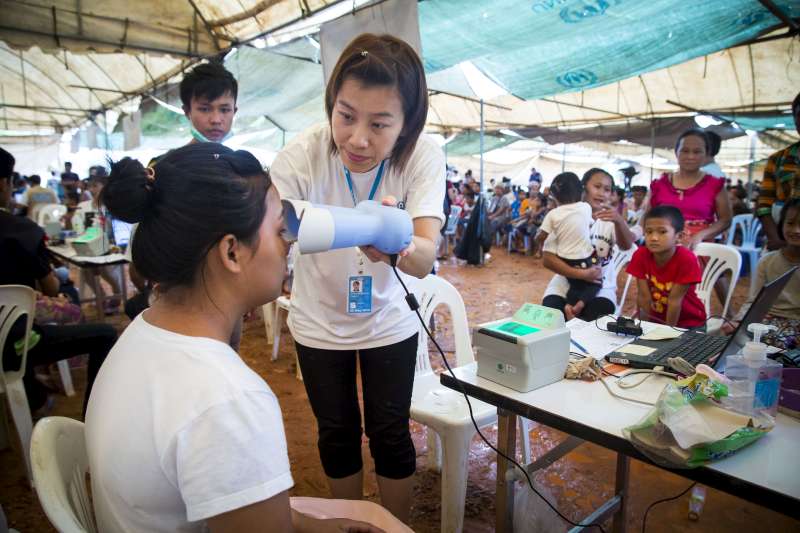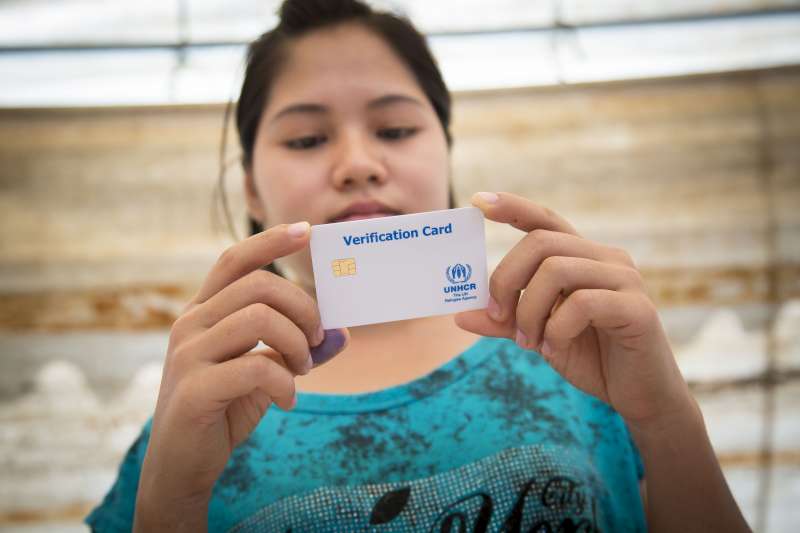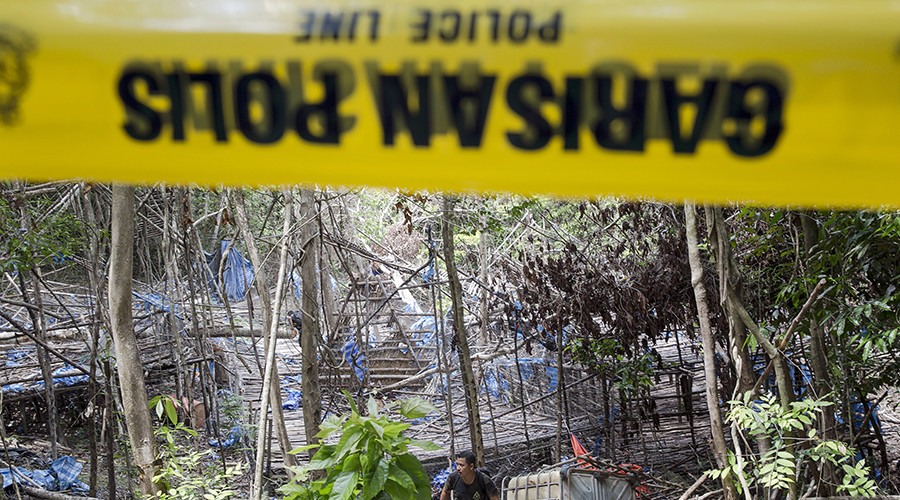Towle: ‘Very little interaction between the UN and Malaysian government on refugee protection issues.’
IT is gut-wrenching, the discovery of human smuggling camps and the bodies of illegal immigrants dumped in mass graves at Songkla and Padang Besar near the Thai-Malaysia border.
In Malaysia, there are allegations of similar "slave camps" which deal in the dirty business of human trafficking.
Because of our porous borders, easy access and relatively robust economy, Malaysia looks inviting to people from less developed neighbouring countries who hope to get in and work illegally.
It is often a cat-and-mouse game with the authorities because if they get caught, those here illegally would be kept at detention centres and deported.
While many are here solely for economic reasons, others like the Rohingyas come because they are forced to flee due to persecution in their own country.
United Nations High Commissioner for Refugees (UNHCR) Malaysia representative Richard Towle says of the 152,570 refugees registered with the UNHCR, 94 per cent are from Myanmar, 40 per cent of whom are Rohingyas.
And he says although Malaysia has not signed the 1967 Protocol to Recognise the Status of Refugees or the 1951 UN Convention on Refugees, the fact is that "there are a lot of people coming in".
Other than the 152,570 UNHCR registered refugees, Towle believes there are tens of thousands more who have not registered and "whom we know nothing about."
"The choice for Malaysia now is whether they remain faceless and in the black and grey economy or for the authorities to take steps to try and find out who's here through some kind of registration programme.
"If the government is concerned about law and order, criminality and security, the only way to deal with it is through some kind of registration programme. If no steps are taken to find out who is here, then they will remain in this dark grey area of exploitation and criminality," he says.
In Malaysia, a refugee is not allowed to work legally.
Since they cannot go home anyway and they need money to survive, most end up working illegally for horribly low wages.
"They live in a highly exploited labour economy where young children are working and where we see the magnet of trafficking and smuggling rings working every day.
"Images of people dying at labour camps at the Malaysia-Thai border are appalling. These are foul exploitative trades and practices. People leave their country because they are so desperate.
"Decisive cooperative action between states needs to be taken, otherwise these (exploitative) practices will continue," warns Towle.
For this, Towle believes a comprehensive rethink and set of responses that address both human security and state security at the same time are necessary.
He points out that currently, the UNHCR's working relationship with the Malaysian government revolves around only arrests and detention issues.
He would prefer a "closer collaboration" with the government on the management of refugees.
As Towle bluntly puts it, the days of refugees here resettling to third countries are coming to an end because there are bigger crises elsewhere demanding international attention, such as the Middle East, Sub Sahara and Africa.
"The number of places available for resettlement internationally for the refugees in Malaysia is also shrinking fast, so we need to try and find a solution soon.
"Last year, we submitted 15,000 applications for resettlement but this year the number will be half of that because there is no longer the same degree of interest."
Of the applicants last year, only 11,000 got settled in third countries.
In January, Deputy Home Minister Datuk Seri Dr Wan Junaidi Tuanku Jaafar said Malaysia accepted refugees into the country out of compassion and as a temporary measure even though it is not a signatory to the UN protocols on refugees. This is because it has an international arrangment that third countries would take them in.
Wan Junaidi was quoted as saying the time has come for the UN to resettle these refugees to third countries because they cannot remain in Malaysia indefinitely.
Apparently, with the shrinking numbers and new realities, this is unlikely to happen.
For Towle, it is "unavoidable" that states now have to take a step forward and assume greater responsibility for managing refugees themselves.
"It is not possible in 2015 for the UN and particularly the UNHCR to do everything on their own. The size of the problem is too large and too complex and the solutions don't lie with UNHCR.
"We are in many ways a Band-Aid organisation. We apply interim help in the meantime but the problem for people is the lack of solutions," he says.
He notes that the refugee problem in Malaysia is almost entirely linked to the problem of Myanmar itself as 94 per cent of the refugees are from there.
People are fleeing because of persecution and serious human rights violations and he says that if nothing is done, that number will grow.
"For us, there are no humanitarian solutions for the refugee problem. There are only political solutions."
Towle says when large numbers leave their country, it affects "in deep ways" the situation and society of other countries and is no longer the domestic affair of one country.
"It has a serious impact on other countries. Malaysia is feeling that. So in our view, the answer is to find a peace-based and political solution in Myanmar itself," he says.
He points out that Malaysia, being the chair of Asean and having a two-year non-permanent seat in the UN Security Council, gets an "important opportunity" to raise this issue.
"In the meantime, we do what we can to try to manage the situation," he says.
Towle thinks Malaysia should step up to manage the refugee situation in the country and find a durable solution.
"If you give refugees the right to work, your cost goes down because they can then work lawfully and not be exploited by people or organisations that take money off them at every opportunity.
"And you can control where people live, who they are by biometric data. And they can pay taxes.
"If one of the main concerns is criminality, the best way to deal with it is through some sort of regularisation and programmes."
There is also a very real fear that if the Myanmar nationals are allowed to remain in Malaysia, they might carry over their ill feelings, conflict and fight on Malaysian soil.
Last year, there was a spate of brutal killings of Myanmar nationals in Penang which the police suspect is linked to the ethnic tensions between the Buddhists and Muslims in their own country. Some suspects have already been charged in court.
Towle acknowledges that this is a real concern that needs to be looked at.
"You don't want to have an export of sectarian or other kind of conflict into your own society. We have seen the spilling over of conflicts in other parts of the world. It is a real risk.
"I understand well the concerns of the problem but none of that addresses the answer. You can be concerned about criminality, violence, deaths and exploitation but one needs a plan to deal with it."
He thinks a regional cooperation framework to deal with these kind of challenges and issues in a comprehensive way is the way to go.
One of the reasons UNHCR is pushing for more government action with regards to the refugees is because it is stretched in other parts of the world.
"Our ability to provide support in the way we have in the past to Malaysia is getting less because we have fewer resources available to do this. That is why it is so important that we have a stronger working collaboration with the government," he explains.
Towle says UNHCR's collaboration with Malaysia currently is rather unusual compared to most other countries because there is very little interaction between the UN and the Malaysian government on refugee protection issues.
"The problem in Malaysia is that all responses to the refugees are dealt with by the UNHCR in isolation. We register, we process and we determine who gets protection and goes to school in the parallel education system (refugees are not allowed to attend national schools.)
"There is very little opportunity for direct engagement with the government on the management of refugees in health, education and livelihood or in registration. This is what we would like to change. It is very important that in 2015, these kind of issues are addressed."
He says the world today has changed and the responsibilities on government today is different from the 1970s and 1980s during the Indo-China boatpeople refugee crisis.
"The nature of global security is different, criminality is far more sophisticated. Organised smuggling and trafficking are a concern to all of us."
UNHCR, he adds, has data and the biometric prints of the UNHCR refugees and it would be helpful to work with the Malaysian government on this to share data so that they have a better understanding on who is here.
Towle believes there should be different responses to the different groups of refugees.
"We think there are end of refugee cycle opportunities for some groups, particularly the ethnic groups in Myanmar who are part of a peace process."
He says one-third of the Myanmar refugees here are the Chin people while 40 per cent are Rohingyas. While there is no guarantee if the Rohingyas will ever be able to return to their home country, the situation with the Chin is different as they no longer need refugee protection.
"So it makes sense for them to have the right to work here legally for a limited period of time. Their situation can later be reviewed, including the possiblity of them going home," he says.
There are also about 3,970 Sri Lankan refugees in Malaysia who came during the height of the fight between the Singhalese government and the Liberation Tigers of Tamil Eelam (LTTE).
That conflict is over now and Towle says UNHCR is no longer extending refugee protection for new Sri Lankan cases.
Towle says the situation in Sri Lanka has shifted a lot over the past three years and the refugees are able to go home. The UNHCR refugee card has a validity of three years.
"We try to have a constant review of the changing fortunes of countries of origin that produce refugees. That would be a normal and responsible way to manage. Otherwise we would be left with a one-way street.
"Why would the host nation buy into this if nobody ever goes home? There has to be an end if possible."
- See more at: http://news.asiaone.com










